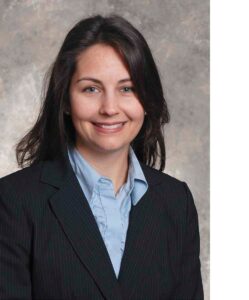I have a special fondness for donuts, although that wasn’t always the case. As a child, I found them too sweet. My mother was kind enough to take me to the donut shop early so we could buy some before they were glazed. Over time, I grew to like cake donuts, cinnamon sugar donuts and, now, love the traditional version, although I still scrape off a lot of the sugar. It must be hereditary because my eldest does not really like donuts either—yet. I really appreciate when our nursing team brings donuts in on Friday mornings.

Dr. Solow
It is the small things that matter. Big numbers like $3.7 billion in lobbying money1 or 10,000 bills introduced in the 117th Congress2,3 seem overwhelming and can get in the way of the things that matter more—the impacts on our practices and patients—which brings me back to donuts. Although the donuts do help my morale, they are probably not the healthiest way to prevent burnout.4
Advocacy may be one avenue that can help. What does it mean to lobby Congress? How will that help someone feel more empowered or experience less moral distress? During my tenure as chair of the ACR’s Government Affairs Committee (GAC), I’ve learned about the topsy-turvy rhythm of government, the role of lobbying firms, how laws are made and then interpreted on the administration side. Most importantly, I’ve learned that even a small voice—with persistence—can effect change over time. To some degree I’m preaching to the choir because you’re already reading this article, and maybe you like donuts, too. My hope is you will take this to heart and talk to your friends and colleagues about how advocacy can make a difference in the way we practice medicine and the way that we’re able to take care of our patients. We need much larger numbers lending their voices in small ways to help effect change.
Advocacy Highlights from 2022
We recently returned from lobbying Congress in September during our annual Advocates for Arthritis Hill Day, focusing on two main issues: step therapy and copay accumulator programs. In collaboration with the Committee on Research, we also met with the leadership team at the National Institute of Arthritis & Musculoskeletal & Skin Diseases (NIAMS) on strategic research goals and funding opportunities for rheumatology researchers.
In my final update to you as GAC Chair, I highlight several areas of active efforts with results to date.
Reimbursement: Medicare cuts are looming. We expect a 2.75% cut, plus possibly a PAYGO 4% cut to go live on Jan. 1, 2023, unless Congress legislates a fix to avoid those cuts. One such solution is the Supporting Medicare Providers Act of 2022. You can easily tell your legislators to support this legislation from our Legislative Action Center.
The 2023 proposed rule for the Medicare Physician Fee Schedule (PFS) included major cuts to ultrasound reimbursement, but intact valuation of evaluation and management services (E/M). Unfortunately, although not unexpectedly, additional cuts to reimbursement were proposed. We have sent letters to the Centers for Medicare & Medicaid Services and are fighting back with other coalitions and the American Medical Association (AMA). We are shifting our advocacy focus to reform the PFS in line with the AMA and other specialties. Read more in my recent op-ed in The Hill.
Utilization management: This may be the ultimate pain, requiring at times a very fine donut fix! Prior authorization and step therapy legislation is in both the Senate and the House, and we are hoping to get the bills across the finish line. The prior authorization bill passed in the House, so we are hopeful.
We are monitoring the FTC investigation into pharmacy benefit manager (PBM) practices closely. We have been working on Medicare downcoding with the ACR Insurance Subcommittee of the Committee on Rheumatologic Care. Robust activity at the state level targeting these issues has been ongoing.
Research funding: Arthritis research funding from the Department of Defense was stalled this year due to budget and administrative hurdles. We are closer to this resource than before and hope that next year we can inch closer.
Pandemic: The public health emergency (PHE) was extended yet again, although we expect this to be the last time. We have supported telehealth provisions in the PFS, and legislation has extended flexibilities well into 2023. Further advocacy will be needed to maintain this resource for patients.
Reproductive healthcare: The Supreme Court ruling on Dobbs overturning Roe v. Wade has had profound impacts on our delivery of patient care. The ACR government affairs team is tracking federal, administrative (HHS, FDA) and state conversations around these substantial impacts and the next steps for rheumatology physicians and interprofessional team members.
Drug pricing: The passed Inflation Reduction Act includes provisions that allow Medicare to negotiate drug pricing for the most expensive medications. This is an enormous shift in policy that can impact the cost of drugs in the U.S.
If you made it this far, you care a lot, too. Head over to RheumPAC to invest in our seat at the table. To lend your voice, send a pre-written letter to your members of Congress from the Legislative Action Center, and encourage others to do so too.
Thank you as always to the hard-working GAC members, whose invaluable insights guides our agenda, and to our ACR staff team of extraordinary people who care a lot about how to make healthcare better.
Wishing you a happy holiday season, and maybe an apple cider donut or two.
Elizabeth “Blair” Solow, MD, is chair of the Government Affairs Committee for the ACR and an assistant professor of medicine in the Division of Rheumatic Diseases at UT Southwestern Medical Center, Dallas.
References
- Total lobbying spending in the United States from 1998 to 2021. Statista. 2022. 2022 Sept 30. https://www.statista.com/statistics/257337/total-lobbying-spending-in-the-us.
- Kight SW. How many bills Congress has passed so far. Axios. 2022 Mar 7. https://www.axios.com/2022/03/08/congress-bill-legislation-vote-passed-biden.
- Statistics and historical comparison. GovTrack. (n.d.) https://www.govtrack.us/congress/bills/statistics.
- Eisenstein L. To fight burnout, organize. N Engl J Med. 2018 Aug 9;379(6):509–511.


